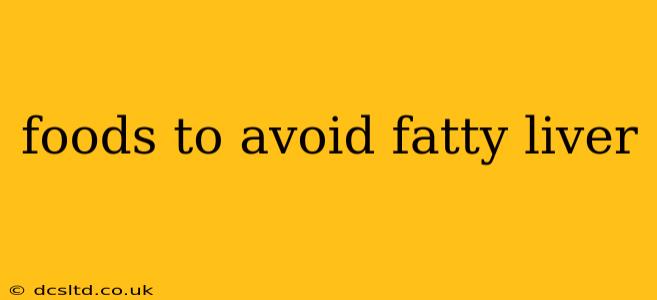Foods to Avoid for a Fatty Liver: A Comprehensive Guide
A fatty liver, or hepatic steatosis, occurs when excess fat accumulates in the liver. While there are different types, the most common is non-alcoholic fatty liver disease (NAFLD), often linked to lifestyle factors like diet and weight. Managing NAFLD, and preventing its progression, often involves dietary changes. This guide details foods to avoid to protect your liver health.
Understanding the Link Between Diet and Fatty Liver
A diet high in certain foods can contribute to the development and worsening of fatty liver. These foods often contribute to weight gain, insulin resistance, and inflammation—all factors that exacerbate NAFLD. Therefore, avoiding these foods is crucial for maintaining a healthy liver.
1. Sugary Drinks and Foods:
What to avoid: Sodas, fruit juices (even natural ones, in large quantities), energy drinks, sweetened teas, candies, pastries, and processed foods laden with added sugars.
Why: Fructose, a type of sugar commonly found in these foods and drinks, is metabolized primarily by the liver. Excessive fructose consumption overwhelms the liver, leading to fat accumulation and inflammation. Cutting back significantly on added sugars is a cornerstone of a fatty liver-friendly diet.
2. Processed Foods:
What to avoid: Packaged snacks (chips, crackers), frozen meals, fast food, and other highly processed foods.
Why: These foods are often high in unhealthy fats (trans fats and saturated fats), added sugars, sodium, and preservatives. These ingredients contribute to weight gain, inflammation, and insulin resistance, all of which can worsen fatty liver. Opt for whole, unprocessed foods as much as possible.
3. Unhealthy Fats:
What to avoid: Foods high in trans fats (found in some fried foods and baked goods) and saturated fats (found in red meat, full-fat dairy products, and some processed foods).
Why: Trans fats are particularly harmful to liver health, contributing significantly to inflammation and fat accumulation. While saturated fats aren't as damaging as trans fats, limiting them is still crucial for overall health and liver function. Choose healthier fats like those found in olive oil, avocados, and nuts.
4. Refined Carbohydrates:
What to avoid: White bread, white rice, pastries, and other foods made from refined grains.
Why: Refined carbohydrates are quickly digested and absorbed, leading to spikes in blood sugar levels. These spikes can contribute to insulin resistance, a key factor in the development of NAFLD. Opt for whole grains, which are digested more slowly and help regulate blood sugar.
5. Alcohol (For Alcoholic Fatty Liver Disease):
What to avoid: Excessive alcohol consumption.
Why: Alcoholic fatty liver disease (AFLD) is a specific type of fatty liver disease directly caused by excessive alcohol intake. If you have AFLD, complete abstinence from alcohol is essential. Even moderate drinking can increase the risk and worsen the condition. If you're concerned about alcohol's impact on your liver, consult your doctor.
6. Foods High in Cholesterol:
What to avoid: Organ meats (liver, kidney, etc.), egg yolks (in large quantities), and fatty cuts of meat.
Why: While cholesterol's role in NAFLD is still under investigation, high cholesterol levels can contribute to overall liver stress and inflammation. Moderating cholesterol intake is a sound strategy for overall liver health.
Frequently Asked Questions (FAQs)
What are some healthy alternatives to the foods I should avoid?
Focus on whole, unprocessed foods like fruits, vegetables, lean protein (fish, poultry, beans), whole grains, and healthy fats (olive oil, avocados, nuts). These foods provide essential nutrients and help support liver health.
How much weight loss is necessary to improve fatty liver?
Even modest weight loss (5-10% of your body weight) can significantly improve fatty liver. This weight loss should be gradual and sustainable, achieved through diet and exercise.
Can exercise help manage fatty liver?
Yes, regular physical activity is crucial for managing fatty liver. Exercise helps improve insulin sensitivity, reduces inflammation, and promotes weight loss.
What are the symptoms of fatty liver disease?
Many people with NAFLD have no symptoms. In more advanced cases, symptoms can include fatigue, abdominal pain, and jaundice (yellowing of the skin and eyes).
Should I consult a doctor if I think I have a fatty liver?
Yes, it's essential to consult your doctor if you suspect you have a fatty liver. They can perform tests to diagnose the condition and recommend appropriate treatment and lifestyle changes.
Disclaimer: This information is intended for general knowledge and informational purposes only, and does not constitute medical advice. It is essential to consult with a qualified healthcare professional for any health concerns or before making any decisions related to your health or treatment.
